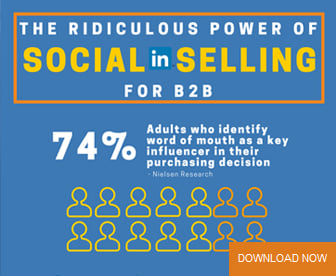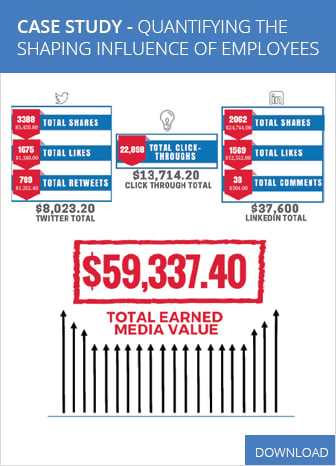Why Employee Advocacy Should Be Part of Corporate Marketing Strategy
Employees have been an untapped resource for business marketing and brand initiatives, despite the steady growth of social marketing and content distribution across social channels on which they are already active. The overwhelming majority of brand advocacy has taken place through corporate channels – on company Facebook pages, Twitter accounts, and LinkedIn profiles, and on countless other social channels.
Lately, however, there’s been a trend towards building employee engagement and leveraging employees’ social circles to broaden the reach of brand exercises, and the general consensus is businesses that have developed employee advocacy strategies can gain a competitive advantage.
One of the challenges with corporate social initiatives is they are often monotonous and rigid in terms of language and messaging. While effective, they are recognized as branded posts or comments and, as such, are viewed with a certain level of inherent bias.
Employee advocates, on the other hand, tend to be viewed more objectively, stemming from the assumption that they’re going to talk about topics, products, and brands with which they are familiar, but also about which they have legitimate views. The fact that they often post about other brands they have experienced in their personal lives builds credibility and helps temper the inherent bias in singularly branded corporate posts.
Active employees also tend to be able to build a bigger following than corporate accounts, because they post on a variety of topics and because their social circles are more diverse than a single corporate product or brand. It’s often been noted that business users are also consumers, giving way to the term “prosumer” but, the reverse is also true – followers and friends in employees’ social circles are also professionals to whom your brand may otherwise not have access. So, while research has shown there is some overlap between corporate and personal social circles, research by Dell suggests it is less than ten percent with Twitter followers. That means there is an immediate opportunity for expanding brand reach into a new group of potential customers.
Employees also have varied experiences and areas of expertise, which is likely to appeal to different audiences. Thus, by encouraging employees to engage in their social environments, businesses are, again, able to effectively deliver customized messages to different interest groups. A developer, a media specialist, and an IT manager, for instance, are able to deliver three very different messages about a brand, all of which are relevant, but are likely to attract interest from different individuals. So, not only does employee advocacy grow the sheer number of people exposed to a brand, it also delivers contextual messaging to different groups based on the employees’ own experiences – which also have a higher probability of creating connections with their spheres of influence.
In addition to an ability to significantly expand influence, employees often are viewed as more reliable and trustworthy sources of information. It’s simple – they’re not likely to post comments or information to their social accounts they don’t support, creating a level of influence that eclipses that of corporate efforts exponentially. Nielsen reported that 83 percent of respondents globally trust recommendations from friends and family. A Gartner study indicates 70 percent trust recommendations from people they know (only 15 percent said they trust corporate social posts).
That’s not to suggest dropping corporate social initiatives is the right option – a social presence is pretty much a must-have today. If you can’t be found online, you may as well not exist. But, businesses should strongly consider the benefits of employee advocacy as an adjunct to their existing efforts, and then watch their overall sphere of influence grow substantially.
Edited by Erik Linask











